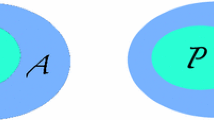Abstract
Implicit schemes are a popular approach to the discretization of linear partial differential equations by finite differences. They require to solve a set of linear equations in each time step. Since finite difference discretizations lead to a local coupling, these systems of equations are sparse and can be effectively solved by iterative methods. Numerical procedures of this type are known in control theory as repetitive processes. They have mostly been used to solve problems in control like processes where passes of finite length are repeated over and over. This paper shows how the implicit discretization of partial differential equations can be cast into the framework of repetitive processes. Thus it establishes a link between yet unrelated results in numerical mathematics and control theory.
Similar content being viewed by others
Explore related subjects
Discover the latest articles and news from researchers in related subjects, suggested using machine learning.References
Bristow D. A., Tharayil M., Alleyne A. (2006) A survey of iterative learning control. IEEE Control Systems Magazine 26(3): 96–114
Cichy, B., Galkowski, K., Rogers, E., & Owens, D. (2005). Control of a class of ’wave’ discrete linear repetitive processes. In Proceedings of the 2005 IEEE international symposium on intelligent control and 2005 mediterranean conference on control and automation. Limassol, Cyprus.
Cichy, B., Galkowski, K., Rogers, E., & Kummert, A. (2009). Iterative learning control for the ’wave’ linear repetitive processes. In 6th Interational workshop on multidimensional (nd) systems (nDS09). Thessaloniki, June/July.
Collatz L. (1968) Funktionalanalysis und numerische Mathematik. Springer, Berlin
Galkowski, K., Paszke, W., Rogers, E., & Owens, D. (2001). The state-space model of wave linear repetitive processes. In Proceedings of the international symposium on mathematical models in automation and robotics (Vol. 1, pp. 119–123).
Garcia A. L. (1994) Numerical methods for physics. Prentice-Hall, Englewood Cliffs, New Jersey
Golub G. H., van Loan C. F. (1989) Matrix computations. Johns Hopkins University Press, Baltimore, London
Golub G. H., Ortega J. M. (1996) Scientific computing: Eine Einführung in das wissenschaftliche Rechnen und Parallele Numerik. B. G. Teubner, Stuttgart
Grenander U., Szegö G. (1958) Toeplitz forms and their applications. University of California Press, Berkeley and Los Angeles
Hildebrand F. B. (1968) Finite-difference equations and simulations. Prentice-Hall, Englewood Cliffs, New Jersey
Mitchell A. R., Griffiths D. F. (1980) The finite difference method in partial differential equations. Wiley, London
Rabenstein, R., & Steffen, P. (2009). Implicit discretization of linear partial differential equations and repetitive processes. In 6th International workshop on multidimensional (nd) systems (nDS 09) (pp. 113–119). Thessaloniki, June/July.
Rabenstein, R., Steffen, P., & Galkowski, K. (2007) Stability of two-step repetitive processes based on matrix formulation. In 5th International workshop on multidimensional (nd) systems (nDS 07). Aveiro, June.
Rogers E., Galkowski K., Owens D. (2007) Control systems theory and applications for linear repetitive processes. Springer, Berlin
Smith D. (1969) Numerical solution of partial differential equations. Oxford University Press, London
Varga R. S. (2000) Matrix iterative analysis. Springer, Berlin
Zurmühl R. (1964) Matrizen. Springer, Berlin
Author information
Authors and Affiliations
Corresponding author
Rights and permissions
About this article
Cite this article
Rabenstein, R., Steffen, P. Numerical iterative methods and repetitive processes. Multidim Syst Sign Process 23, 163–183 (2012). https://doi.org/10.1007/s11045-010-0115-2
Received:
Revised:
Accepted:
Published:
Issue Date:
DOI: https://doi.org/10.1007/s11045-010-0115-2




